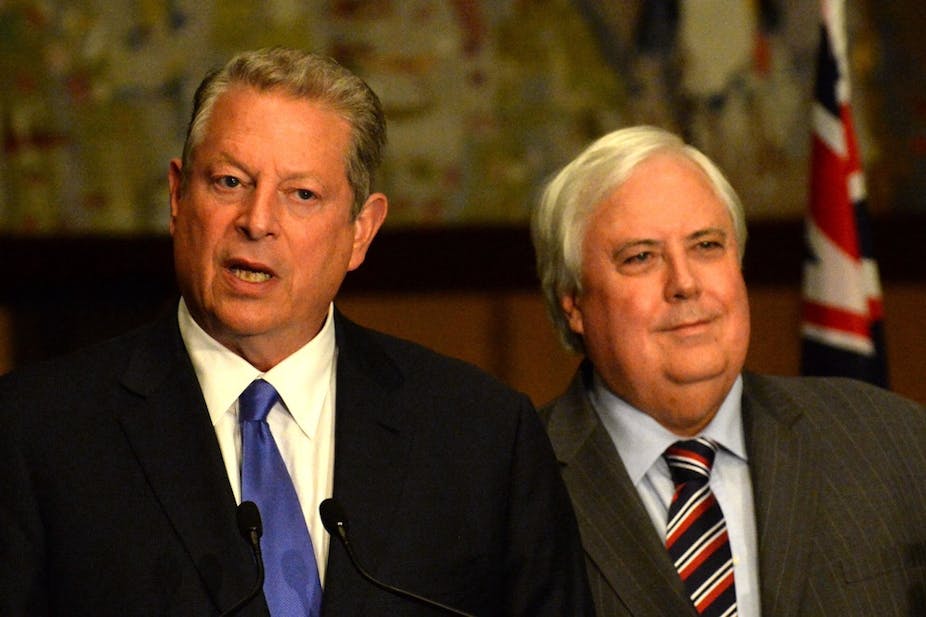Clive Palmer has been an easy target for some to lampoon, but this week he has proved himself to be a shrewd political operator.
Who would have guessed that Palmer would forge a partnership with a former US Vice President and environmental warrior? Who would ever have dreamed that Al Gore, the environmental warrior, Nobel Peace Prize recipient, the teller of inconvenient truths, would be endorsing what for many people is one of the lunatic fringe minority parties uncomfortably injecting themselves into parliamentary decision- making?
But it happened. And Clive Palmer has managed to craft a political strategy that will likely see the carbon tax abolished, but the retention of the Green Energy Finance Corporation, the Renewable Energy Target (RET) and the Climate Change Authority.
He is also pushing for legislative amendments that seek to compel business to hand on the savings to consumers in the former of lower prices. Perhaps the biggest surprise was his support for a carbon trading scheme similar to the one originally promised by former Labor Prime Minister, Kevin Rudd, but with the proviso that it was only comes into operation once Australia’s trading partners established their own carbon trading schemes.
There is now some space for more sober assessment of it all. To begin with, it is worth noting that many unknowns remain about the details of the proposal on the table – how for instance will consumers be guaranteed price reductions will flow on? It could be an administrative nightmare – for government and for business. More likely, it will be more window dressing than a hard legislative intervention.
What all this means for business depends on the industry. There will be a collective sigh of relief from the renewable energy sector who see the retention of the broader framework established by Labor as critical to its continued growth and profitability. Again, Palmer has managed to attract support from an unlikely ally.
However, business support from other quarters is hard to find. Representing the big end of town, the Business Council of Australia has made its continued opposition to the Renewable Energy Target well known and expressed disappointment that it may now continue. For the Australian Chamber of Commerce and Industry, the major industry body representing small business, the danger lies in the prospect of the resurrection of the Carbon Trading Scheme. Both groups expressed concern that this policy shift represents a new era of ongoing uncertainty around environmental policy and its impact on business.
Indeed, for those sectors likely to be most affected by carbon pricing, uncertainty about the future is somewhat greater. While there was short term certainty around the carbon tax (whatever you think of its merits), if Palmer’s proposed carbon pricing scheme is to enacted, it is far from clear when and how it is to be implemented. Having no doubt spent a great deal on preparing for the existing scheme and its affect their businesses, the task may need to start again.
More broadly there will be growing concern among business leaders over what Clive Palmer’s growing influence on the dynamics of parliamentary politics will produce in the future. If this is any indication, PUP may provide ongoing support for Abbott’s key policy agenda items, but perhaps on terms that will test his pragmatism.
For business, it will be the fact that Palmer equals uncertainty that will drive a growing concern over whether government is able to deliver on the types of reforms it was hoping for.
For many it may be easy to see this as a one-off event – a rabbit-out-of-the-hat moment – in which the Palmer United Party has managed to manoeuvre itself into a prime position to drive the direction of policy.
But that may be a position that underestimates Clive Palmer’s ability to find novel solutions to hairy political problems. After all, his rise as a businessman has been built on just this sort of acumen.

